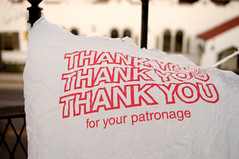by Alex Francis
 Photo by Jonathan Youngblood | Flickr.com
Photo by Jonathan Youngblood | Flickr.com In this blog, we’ve highlighted innovative uses for old toilets and the commendable ways that big corporations are integrating recycling programs into their business models. Today, we want to shine a spotlight on some of the cities and establishments that have made an effort to eliminate, or at least minimize, the common use of plastic shopping bags.
What’s Wrong With Plastic Bags?
In theory, nothing. They can hold a sufficient amount without getting too heavy, they are easily compacted for efficient storage, and they even make for a good bike seat cover when it rains.
Realistically, however, they have proven to be more trouble than they’re worth. The main problem is that plastic bags are not biodegradable—that means, when you throw them out, they end up in a landfill and just sit there for hundreds of years without decomposing. So your children, and your children’s children, and even your children’s children’s children could find a bag that you threw out if they dug down deep enough, which is simultaneously fascinating and horrifying. And throwing out plastic bags is especially bad, because a lot of people tend to use them as trash bags, ensuring not only that they end up in a landfill, but that other trash is trapped inside of them.
Now if all of that weren’t bad enough, Natural-Environment.com estimates that based on our current usage (which could reach as high as 1 trillion per year), it takes up to 100 million barrels of oil to make a one-year supply of plastic bags. Yikes.
With all of that in mind, here two pioneers who have taken a stand against the-bags-that-won’t-die.
The City of San Francisco
Back in 2007, San Francisco became the first city in the United States to impose any sort of ban on plastic bags. The initial ordinance affected supermarkets and pharmacies with sales higher than $2 million per year, but it has since been expanded to include all retailers citywide. And now, dozens of other cities across the US have followed suit, enforcing bag bans of their own.
SeaWorld Parks & Entertainment
Toward the end of 2012, Sea World announced that it would stop using plastic bags at all of their theme parks and instead replace them with 100% recycled paper bags, making it the largest theme park operator to implement such a ban. Jim Atchison, president and CEO of SeaWorld Parks & Entertainment, commented that “Eliminating plastic bags is an important statement about our commitment to the environment, as well as the need to help protect marine animals from debris.”
Since the National Resources Defense Council estimates that plastic makes up 60-80% of the trash in the ocean, removing plastic bags from marine theme parks seems like an appropriately symbolic move.
CJ Environmental Supports Taking Care of the Earth
CJ Environmental not only supports reduced usage of plastic bags, but leads an environmental mission of its own. Our Massachusetts-based company tackles precious metal refining, electronic scrap refining, and dental refining to make sure our earth’s limited reserves of precious metals don’t go to waste.
Related Blogs
- Related Blogs on Spotlight: Places That Have Banned Plastic Bags
